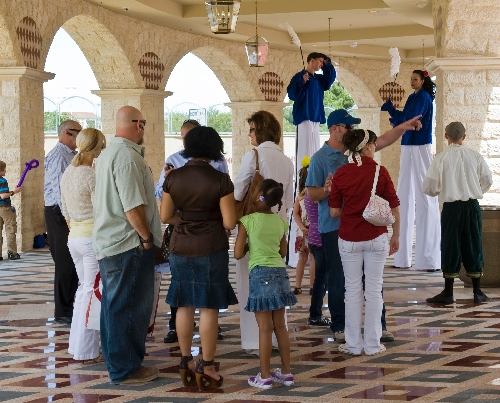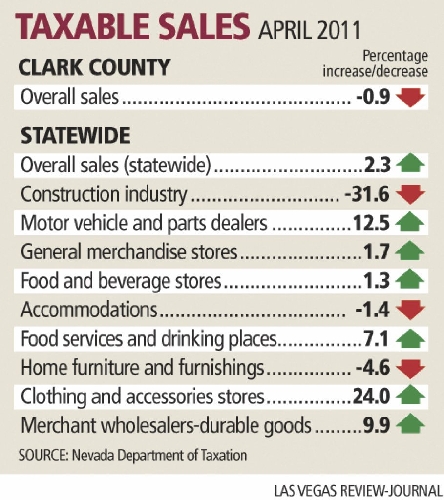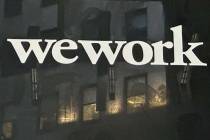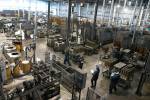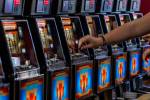Nevada taxable sales rise in April; Clark County down
Local consumers just can't shake the recession.
New statistics on taxable sales, which measure purchases of tangible goods from Nevada's businesses and retailers, show continued softness in spending in Clark County.
Taxable sales here fell to $2.47 billion in April, down 0.9 percent from $2.49 billion in April 2010, the state Department of Taxation reported Monday.
Clark County's falloff came even as taxable sales statewide rose, jumping to $3.35 billion. That's up 2.3 percent from $3.28 billion a year earlier.
The Taxation Department's numbers came out the same day as new nationwide figures showing that May's consumer spending was the weakest since June 2010, as rising energy prices and high unemployment discouraged discretionary purchases. Couple that national weakness with even worse unemployment and a terrible housing market in Las Vegas, and you have a one-two punch that knocked out spending by both tourists and locals.
"Consumers are operating much more cautiously than they once were," said Brian Gordon, a principal with local research firm Applied Analysis. "They have less access to capital and are more focused on their budgets."
April 2010's numbers for Clark County were artificially inflated by a one-time, $100 million surge in spending in the category of electrical equipment, appliance and computer manufacturing, which more than accounts for the 0.9 percent sales decline. A spokeswoman for the department said she couldn't disclose the company behind the purchase because of confidentiality rules.
Still, observers say the latest report shows consumers just aren't ready to spend much, yet.
"Even putting aside that big expenditure, there's a bit of softness in the numbers," said Steve Brown, director of the Center for Business and Economic Research at the University of Nevada, Las Vegas. "National spending is a little soft, and consumers nationwide are confronted with higher food prices, higher energy prices, falling housing prices and really slow-growing employment. That downdraft is hitting the Nevada economy."
Spending across the board was mixed.
Sales in accommodations, which measures purchases at retail stores in hotels, dropped 1.4 percent statewide and 1.1 percent in Clark County. Accommodations sales generally come from visitors, Gordon said. And while local visitor volumes have been increasing in recent months, spending per tourist has remained somewhat sluggish, he said.
Furniture sales fell, too, by 4.6 percent statewide and 5.5 percent in the county.
Some categories showed signs of life, though.
Dealers of cars and car parts posted a 12.5 percent sales gain statewide and an 11.3 percent jump locally, while clothing retailers saw sales spike 24 percent statewide and 24.3 percent in Clark County. Bar and restaurant sales increased 7.1 percent across the state and 7.2 percent in Clark County. That's a key jump because the category is the single-biggest spending area, with 22.4 percent of the county's total.
Gordon said "recession fatigue" could be behind some of the increases, as consumers with relatively stable employment have tired of keeping their wallets shut. Plus, consumers held off on big-ticket purchases such as cars during the recession, and may no longer be able to delay trading in older models on their last legs.
Consumer spending isn't likely to rise noticeably in Nevada, experts said.
Brown forecasts a "slight upward trend" in sales for the rest of 2011, but in any given month, sales could stumble, he said.
"We see weak signs of recovery, but they're so weak that the slightest downdraft is going to cause sales to be stagnant," he said. "I think we're going to see slower growth nationally than we saw last year, and that's going to mean difficulties in Nevada as far as tourism is concerned."
Gordon said he expects continued modest growth for the next several years, with ups and downs from month to month. There won't be more boom-and-bust cycles.
"We're laying the path for a more sustainable trend," he said.
In all, 14 of Nevada's 17 counties reported gains in year-over-year taxable sales in April. Clark, Churchill and Eureka counties showed declines.
Gross revenue collections from sales and use taxes totaled $265.5 million, a 3.7 percent increase from April 2010. Revenue collections were up 5.4 percent year over year in the first 10 months of fiscal 2011, which began July 1.
Taxes on sales of cigarettes, other tobacco products and liquor were below projections, while the live entertainment tax paid on show tickets came in above forecasts.
Revenue collected from taxable sales helps finance prisons and schools, among other services.
Contact reporter Jennifer Robison at
jrobison@reviewjournal.com or 702-380-4512.



